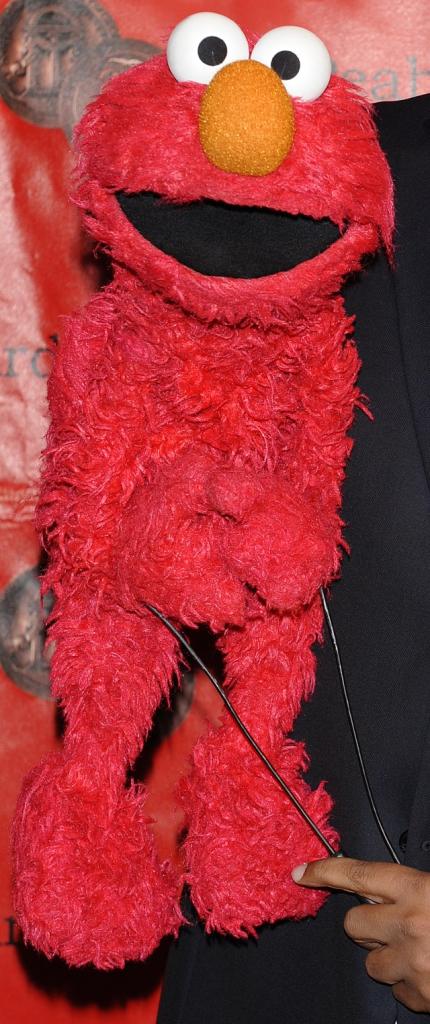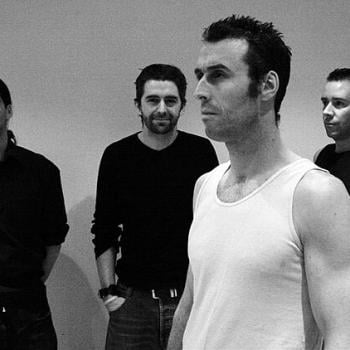
Not just for kids: Missing Nemo, Elmo’s question, and calling 311
I’m not going to sugarcoat the obvious, I watched Finding Nemo. I’m guilty as most others, I’ve given more than my adulthood share of attention to Elmo. To round out this sobering confession, I too have had my moments of head-banging to tracks from the band 311. Combined, does this make me any less of an apologetic punk deconstructionist? Hardly. It is because of this unlikely trio that my mind started to ruminate over past times and their colliding intersection with the current times.
Let’s all settle back into the decade from the mid 1990s through the early 21st century, as we embark on an apologetic punk deconstruction voyage. Accompanied with our haze memory and a rag-tag motley crew, we strive to see what Finding Nemo, Elmo, and the band 311 contribute to our growing faith/belief system.
Nemo, open your eyes, you’re not lost

The word Nemo slipped into pop culture by way of a childish clownfish in May 2003. This seemingly innocent child’s film from the Disney/Pixar film industry drew high audience attention being released in over 6,000 nationwide.
The overarching plot of this animated comedy was to see how an innocent fish, Nemo, finds self-value, worth, and the need to seek help from his companions. What was not expected was the complicated and revealing etymology of the name Nemo. A deconstruction of the name highlights that there is more to find – and rhetorically lose – in this otherwise simple pop culture iconic name.
First, Nemo comes from the Latin term for “nobody” or “no one.” The name Nemo also came into literature from use in Homer’s Odyssey. Point Nemo is the oceanic pole of inaccessibility, the further point on the map from any known land. Nemo is also used as the tag line coined by the depression-era wandering poet Everett Ruess, who mysteriously disappeared in 1934. The name Nemo takes on a modification in Alexander Supertramp’s book Into the Wild, where Nemo means the creative power of the crew (collective body of people working together – for a common purpose). The collective progression. No one person runs the show, we all do (together, collective, unified for a common purpose).
These collected points regarding the etymology of the word, Nemo, point to a cultural balancing act. Nemo can be read as an identity signifier. The thread connecting this embedded use of the name/term Nemo represent it as a syntactical signifier. Following this analysis, Nemo is wedged between the concept of ‘no one,’ and the connective fabric for community. A cultural assumption that Nemo is simply essentialized to meaning ‘nobody’ or ‘no one,’ neglects the imbedded strength of the name as illustrated by Alexander Supertramp (aka Chris McCandless).
A common purpose. The necessity to rely upon others. The faith/belief to endure for the good of the community comes as a shocking realization when the name/term Nemo is placed as a cultural signifier. The absence of self to align with a faith/belief system external from the individual conscious situates Nemo in an apologetic signifying light.
Matthew 20:16 states, “[s]o the last shall be first, and the first [shall be the] last…for may [are] called, [but] few [are] chosen.” Using this text when applied with an apologetic signifying reading, the term/name Nemo positions the internal strength of the community when founded upon faith/belief. The external condition navigates toward the calling for someone. The internal faith/belief is what secures the action-meaning of the presented context. To remain spiritually disciplined is to metaphorically walk away from self-distress and into a collected community centered on the purpose of faith/belief. Nemo signifies that through faith/belief, not work, one can be resolved (Ephesians 2:8-9). Acting in accordance and sharing this apologetic principle with the community, therefore, shares strength from one into the community.
Nemo was not lost. Nemo was an illustration of how-to live-in faith/belief; deny the self and live in faith/belief (Matthew 16:24 – 25, Romans 8:12 – 13). That is the locus provided by the signifying syntax of Nemo. Just a kid’s movie? Hardly.
Did you hear Elmo’s question?

“Elmo is just checking in! How is everybody doing?”
On X (formerly Twitter), Elmo posted, “Elmo is just checking in! How is everybody doing?” This is what sparked the plethora of responses. Dark, humorous, worrisome, bleak, and every other emotional response that could be projected. In a CNN article, AJ Willingham notes, “[t]he responses to Elmo’s innocuous question should be etched into stone so future generations can know exactly how we [read: global society] gelt in 2024.” (2024) Was the reaction to this question so openly reviled because the interlocutor is a fuzzy puppet from a children’s programming channel? Is the projection and direct honest nature of these responses done in consideration of innocence?
This question is presented in nearly everyday situations, “How are you doing?” In return, social norms frame a formalized general response and replace honesty. The script of cultural acceptance has become institutionalized to the point that it has codified. Our coded instincts react, respond, and reference in a context without consideration.
Elmo was introduced in the mid 1980s to Sesame Street and has been a staple since. What is striking about the character is the maintained three attributes central to comprehending the realities of life and identity. NPR pop culture writer Bill Chappell cites the psychologist Carl Rodger who notes that “congruence, meaning authenticity and genuineness – being real,” along with “unconditional positive regard, and empathy that comes from understanding another person.” Elmo captured these elements with a simple question. That’s the surface understanding.
To expand, Elmo is witnessed as a furry, innocent, harmless character. Elmo is a signifying symbol of childhood, a projected image of better, simpler, yet historic times. Combined with the ongoing disturbances of contemporary global society, speaking honestly to a fictional character possibly arrived at a boiling point of civil distress. Elmo may have expressed a simple question borrowed from a therapy template. But it was the returned response that triggered the unexpected. Those statements that would otherwise be shared behind closed confidential doors were broadcast in the light of day. There was no hiding from the collected discourse. The irony is that a socially scripted naïve phrase drew energetic responses to an otherwise banal point.
The takeaway from this epicenter of honesty may be that in turbulent times, don’t overlook the obvious. The rhetorical take away is why did it take a noisy furry puppet to ask a question before the masses started to chime in? That’s one to consider, and not repeat.
Call 311, ‘cause we’re All Mixed Up

During all that’s been going on it would not be a stretch of the imagination if some felt a bit mixed up. To say that these are confusing times is more than an understatement. From one day to the next the socio-political climate changes faster than a champion triathlete. Thankfully, there was a band in the mid 1990s that prophetically provided an anthem for our decade old 2000s.
The reggae pop punk band 311 released a track, “All Mixed UP” (311, 1995) with lyrics that contribute in unusual ways to this analysis.
The track starts,
You’ve got to trust your instinct
And let go of regret
This already points to the need to release the self from a position of knowledge. To rely upon one’s own “instinct” is to abandon the foundation of faith/belief. Proverbs 3:5-6 notes that it is best not to lean on self-reference or personal understanding.
The second line of the song compliments the directive to release the anchors in one’s life. In this reference “regret” is the example. Any personal tie holding back the trajectory into solid faith/belief could be substituted. It’s the pointed call to “let go,” or release no only the penned “regret,” but also the inclination to self-reference life in absence of faith/belief.
The next lines of the lyrics note the personal need to discard the burdens of life that often feel as weights that need to be dropped.
There’s something I need to get off my chest
And no matter what may come to shine
The dream will always be mine
The realization, “no matter what may come to shine,” can be read as the confidence to know that with burdens a release is possible. To release the self of temporal burdens, (“get off my chest”) change will manifest. This process is confirmed by a silent underscored tone of faith/belief. The result is acknowledged by the metaphor “dream.” The “dream,” is the desired release burdens, come into the security of faith/belief, “shine,” and know that the power of faith/belief “will always be mine.”
The chorus is structured to echo the opening lyrics.
All mixed up, you don’t know what to do
Next thing you turn around and find the person is you
Thought a freak might be the thing
But the first could be the last, so just get off of your a#*
In a powerful turn, we see that faith/belief was not lost. We get confused. We get mixed up. We don’t know what to do at some time in our lives. But, when we “turn around and find the person is you,” the confusion demands that we shift our dependance from self to faith/belief.
The third line of this lyrical phrase highlights most of our inherent actions to confusion. At a point of desperation, it would not be uncommon to feel that the “freak might be the thing.” This can be read as external vices to pacify pain. In addition, the “freak” can be our lost sense of self. If we invest time, commerce, and identity on external pop cultural deficits the “freak” (read: unhealthy values) becomes reality. Our fixation is on how to support those unhealthy habits, thinking, manners; our personal “freaks.” We run the risk, then, of getting lost without even recognizing that we have become lost; lost to faith/belief.
The phrase concludes that “the first could be the last,” and that is where we may find ourselves. To deny humble realization we are the first to lose ourselves and the last to know that we are lost. The text from Matthew 20:16 has found its way to apologetically deconstruct pop cultural distractions. In Timothy 3: 1-5 the horrible nature of human existence is spelled out.
The closing lines of that verse charge that we are to have nothing to do with those who live, abide, or participate in such ill values. Likewise, the closing lines of the lyrics by 311 call us to “get off you’re a#*.” Both equate a call to action for reconciliation founded upon the strength of faith/belief.
What a mouthful from this motley crew



A tour de force, Nemo shows us that we are not lost as long as we teether ourselves to faith/belief. Elmo asks a social question that brought forth a mix of syrupy happiness and torturous pain. These companion views illustrate that the current global landscape is unsettled relying on artifacts or culture for identity affirmation. 311 flips-the-script on pop culture using rhythmically placed signifiers as tools to satisfy the release of collected burdens. We learn that far too often we are the first to fall and the last to admit our failures. But, if we move, if we act toward change for our living dream it can be found through sound faith and belief.













